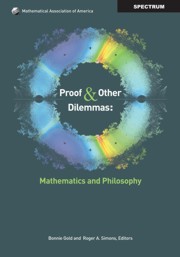Book contents
- Frontmatter
- Contents
- Acknowledgments
- Introduction
- I Proof and How it is Changing
- II Social Constructivist Views of Mathematics
- III The Nature of Mathematical Objects and Mathematical Knowledge
- IV The Nature of Mathematics and its Applications
- 12 Extreme Science: Mathematics as the Science of Relations as Such
- 13 What is Mathematics? A Pedagogical Answer to a Philosophical Question
- 14 What Will Count as Mathematics in 2100?
- 15 Mathematics Applied: The Case of Addition
- 16 Probability—A Philosophical Overview
- Glossary of Common Philosophical Terms
- About the Editors
12 - Extreme Science: Mathematics as the Science of Relations as Such
from IV - The Nature of Mathematics and its Applications
- Frontmatter
- Contents
- Acknowledgments
- Introduction
- I Proof and How it is Changing
- II Social Constructivist Views of Mathematics
- III The Nature of Mathematical Objects and Mathematical Knowledge
- IV The Nature of Mathematics and its Applications
- 12 Extreme Science: Mathematics as the Science of Relations as Such
- 13 What is Mathematics? A Pedagogical Answer to a Philosophical Question
- 14 What Will Count as Mathematics in 2100?
- 15 Mathematics Applied: The Case of Addition
- 16 Probability—A Philosophical Overview
- Glossary of Common Philosophical Terms
- About the Editors
Summary
From the Editors
The question of what mathematics is has never received a satisfactory answer, we feel, although “mathematics is the science of patterns” may come close. Devlin's chapter (which takes that as its definition) discusses briefly some answers that have been tried. This chapter by Robert Thomas is a new contribution to the question, and, we feel, one worth serious consideration. It certainly helps with questions such as the relationship between mathematics and the (other) sciences, and has something to say about the applicability of mathematics.
As this chapter is exploring where mathematics fits into our overall understanding of the world, it is not likely to specifically influence how to teach mathematics. However, both in our courses for mathematics majors and in our service courses (for students who will use mathematics in the service of their majors, and for students taking mathematics to enhance their general education) there is some value to reflecting from on the nature of what we are teaching. Students often appreciate this reflection on where the whole enterprise is going and how it might fit into their world-view. This chapter may be of use as you consider how to talk with your students about mathematics and its role.
Robert Thomas is a Professor of Mathematics at the University of Manitoba in Canada (www.umanitoba.ca/science/mathematics/new/faculty/html/thomas.html). He is the current editor of Philosophia Mathematica, the one journal devoted exclusively to the philosophy of mathematics, and was a founding member of the Canadian Society for the History and Philosophy of Mathematics.
- Type
- Chapter
- Information
- Proof and Other DilemmasMathematics and Philosophy, pp. 245 - 264Publisher: Mathematical Association of AmericaPrint publication year: 2008
- 1
- Cited by



